- Travel Advisories |
- Contact Us |
- MyTravelGov |

Find U.S. Embassies & Consulates
Travel.state.gov, congressional liaison, special issuance agency, u.s. passports, international travel, intercountry adoption, international parental child abduction, records and authentications, popular links, travel advisories, mytravelgov, stay connected, legal resources, legal information, info for u.s. law enforcement, replace or certify documents.
Share this page:
Serbia Travel Advisory
Travel advisory july 26, 2023, serbia - level 2: exercise increased caution.
Reissued with obsolete COVID-19 page links removed.
Exercise increased caution in Serbia due to crime .
Country Summary: Violence associated with organized crime and high-profile sporting events in Serbia is common.
Read the country information page for additional information on travel to Serbia.
If you decide to travel to Serbia:
- Be aware of your surroundings.
- Do not display signs of wealth, such as expensive watches or jewelry.
- Do not answer your door at your hotel/residence unless you know who it is.
- Stay alert in locations frequented by Westerners.
- Be extra vigilant when visiting banks or ATMs.
- Carry a copy of your passport and visa (if applicable) and leave the original in your hotel safe.
- Provide your itinerary to a family member or friend.
- Monitor local media.
- Enroll in the Smart Traveler Enrollment Program ( STEP ) to receive Alerts and make it easier to locate you in an emergency.
- Follow the Department of State on Facebook and Twitter .
- Review the Country Security Report for Serbia.
- Visit the CDC page for the latest Travel Health Information related to your travel.
- Prepare a contingency plan for emergency situations. Review the Traveler’s Checklist .
Travel Advisory Levels
Assistance for u.s. citizens, search for travel advisories, external link.
You are about to leave travel.state.gov for an external website that is not maintained by the U.S. Department of State.
Links to external websites are provided as a convenience and should not be construed as an endorsement by the U.S. Department of State of the views or products contained therein. If you wish to remain on travel.state.gov, click the "cancel" message.
You are about to visit:
Serbia Travel Restrictions
Traveler's COVID-19 vaccination status
Traveling from the United States to Serbia
Open for vaccinated visitors
COVID-19 testing
Not required
Not required for vaccinated visitors
Restaurants
Recommended in enclosed environments.
Serbia entry details and exceptions
Ready to travel, find flights to serbia, find stays in serbia, explore more countries on travel restrictions map, destinations you can travel to now, dominican republic, netherlands, philippines, puerto rico, switzerland, united arab emirates, united kingdom, know when to go.
Sign up for email alerts as countries begin to open - choose the destinations you're interested in so you're in the know.
Can I travel to Serbia from the United States?
Most visitors from the United States, regardless of vaccination status, can enter Serbia.
Can I travel to Serbia if I am vaccinated?
Fully vaccinated visitors from the United States can enter Serbia without restrictions.
Can I travel to Serbia without being vaccinated?
Unvaccinated visitors from the United States can enter Serbia without restrictions.
Do I need a COVID test to enter Serbia?
Visitors from the United States are not required to present a negative COVID-19 PCR test or antigen result upon entering Serbia.
Can I travel to Serbia without quarantine?
Travelers from the United States are not required to quarantine.
Do I need to wear a mask in Serbia?
Mask usage in Serbia is recommended in enclosed environments.
Are the restaurants and bars open in Serbia?
Restaurants in Serbia are open. Bars in Serbia are .

Cookies on GOV.UK
We use some essential cookies to make this website work.
We’d like to set additional cookies to understand how you use GOV.UK, remember your settings and improve government services.
We also use cookies set by other sites to help us deliver content from their services.
You have accepted additional cookies. You can change your cookie settings at any time.
You have rejected additional cookies. You can change your cookie settings at any time.
Entry requirements
This information is for people travelling on a full ‘British citizen’ passport from the UK. It is based on the UK government’s understanding of the current rules for the most common types of travel.
The authorities in Serbia set and enforce entry rules. If you’re not sure how these requirements apply to you, contact the Serbian Embassy in the UK .
COVID-19 rules
There are no COVID-19 testing or vaccination requirements for travellers entering Serbia.
Passport validity requirements
Your passport must have an ‘expiry date’ at least 90 days after the date you plan to leave Serbia.
Check with your travel provider that your passport and other travel documents meet requirements. Renew your passport if you need to.
You will be denied entry if you do not have a valid travel document or try to use a passport that has been reported lost or stolen.
Visa requirements
You can visit Serbia without a visa for up to 90 days within a 6-month period, for business or tourism.
For details about employment visas and long-stay visas, check the information from the Serbian Embassy in the UK .
If you want to extend your stay while you are in Serbia, you can apply at the police station where you’re registered at least 30 days before the 90-day period expires. For more information visit the website of the Serbian Ministry of Foreign Affairs .
Make sure you get your passport stamped.
When entering Serbia, make sure border guards stamp your passport. If you try to leave Serbia without an entry stamp you could face charges of illegal immigration, a heavy fine and a prison sentence.
Land border crossings
Only enter Serbia by land through recognised border crossings. Serbian borders remain open for entry and exit, subject to any entry requirements currently in place in neighbouring countries.
Travelling between Serbia and Kosovo
The authorities in Serbia do not consider the designated crossing points with Kosovo to be official international border crossing points.
It is possible to travel from Serbia to Kosovo, and back again.
To travel from Kosovo to Serbia, you must have a Serbian entry stamp from Belgrade, Niš or Kraljevo airports, or from one of Serbia’s land border crossings with:
- Bosnia and Herzegovina
- North Macedonia
You are likely to be refused entry into Serbia from Kosovo without a valid Serbian entry stamp. We are also aware of isolated incidents where Serbian authorities have cancelled Kosovo stamps in passports of foreign nationals or denied foreign nationals entry to Serbia if they have Republic of Kosovo stamps in their passports.
If you are planning to travel between Serbia and Kosovo, see the Kosovo travel advice .
Tensions between Serbia and Kosovo can cause difficulties at border crossings with Kosovo.
Registering with the police
You must register with the local police where you’re staying within 24 hours of your arrival in Serbia. If you’re staying in a hotel, check-in staff will register you automatically. If you do not register, you could get a fine, and face arrest and a court appearance.
Vaccine requirements
For details about medical entry requirements and recommended vaccinations, see TravelHealthPro’s Serbia guide .
Customs rules
There are strict rules about goods that can be brought into and out of Serbia . You must declare anything that may be prohibited or subject to tax or duty.
You must declare personal items of value you’re carrying – for example, jewellery, cameras and computing equipment. These are exempt from customs duties.
Taking money into and out of Serbia
If you are carrying cash or travellers cheques worth more than 10,000 euros, you must:
- complete a declaration form at customs on arrival in Serbia – a customs officer will certify this by signing or stamping the form
- keep a copy of the certified form while you are in Serbia
- show the certified form when you leave Serbia
If you are taking any Serbian dinars into the country, you must show the receipt from the bank where you bought them.
Customs officers may seize your money if you do not follow these rules.
You should exchange any unwanted dinars before you leave Serbia. British banks do not normally exchange dinars. Do not use street dealers. Only change money through banks or official exchange offices.
It is not possible to exchange Scottish and Northern Irish banknotes in Serbia.
Related content
Is this page useful.
- Yes this page is useful
- No this page is not useful
Help us improve GOV.UK
Don’t include personal or financial information like your National Insurance number or credit card details.
To help us improve GOV.UK, we’d like to know more about your visit today. Please fill in this survey (opens in a new tab) .

- Serbia 2027
- Opportunities
- Attractions
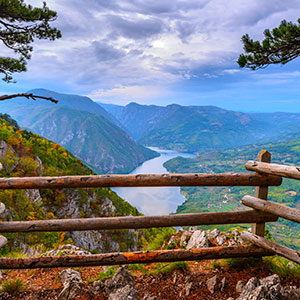
Get to know Serbia
- About Serbia
- Potentials of Serbia
- Constitution of Serbia
- Famous Serbs
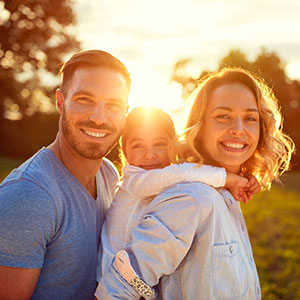
- Preschool education
- Primary education
- Secondary education
- Higher education
- Dual education
Culture and science
- Cultural institutions
- Language and script
- Scientific research
- Projects and innovations
- Intellectual property rights
Health services
- Healthcare facilities
- Health insurance
- Health protection abroad
- Support for persons living with rare diseases
Pension and disability insurance
- Pension insurance
- Social benefits
- Persons with disabilities
Digitalisation
- Education and promotion
- Child safety on the internet
- Trust services
- ePrescription
- Digitisation of cultural heritage
- Digital Farm
- Government Council for IT and innovative entrepreneurship
- Address register update
- Strategy for the Development of Artificial Intelligence in the Republic of Serbia for the period 2020-2025

- Job opportunities
- Programmes of additional education
- IT retraining
- Employment and work engagement programmes
- Labour Law and other laws regulating employment
- Sole proprietors and companies
- Financial support for economy
- Nonfinancial support to entrepreneurs
- Customs tariff
- International agreements
Investments
- Development projects
- Benefits for investors
- Infrastructure
- International tax agreements

- Prime Minister's Activities
- Deputy Prime Ministers' Activities
- Government Activities
- Kosovo and Metohija
- Press Conferences
- Stop Corruption
- Culture and Religion
Press service
- News conferences
- Upcoming events and notifications
- Statements of Government
- Statements of Ministries
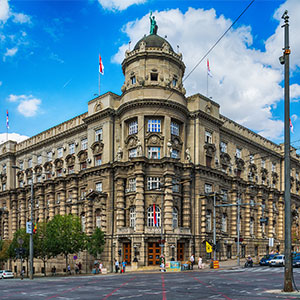
Serbian Government
- Members of Government
- Keynote address
- European integration
- Government websites archive
- Keynotes archive

Keep in touch
- Serbian Government Directory
- Contact form

Whether you have a question, comment, suggestion or any problem falling within the competence of the Government, send us your message and we will try to respond as soon as possible. If your problem does not fall within our competence, we will forward your message to the competent institution.
(If you have already contacted us regarding the same matter, please enter your case number)
Categories:
Covid-19 measures for entry of serbian citizens and foreigners into serbia to be abolished.
The Serbian government announced that as of Tuesday, 3 May, all control measures and restrictions related to the COVID-19 infectious disease for the entry of passengers into the Republic of Serbia will be abolished for Serbian citizens and foreigners alike.
Starting from midnight, Serbian citizens and foreigners will not be required to show proof of a negative PCR test, rapid antigen test, proof of recovery from COVID-19, nor a proof of vaccination upon entering Serbia, regardless of from which country of the world they enter the Republic of Serbia.
The decision on the free entry of Serbian citizens and foreigners into Serbia has been made based on the current epidemiological situation in our country and is line with decisions of majority of countries of Europe and the region.
The relevant institutions continue to monitor the development of the epidemiological situation in Serbia from hour to hour and will inform the public in a timely manner.
It is important to emphasise that this decision does not mean that the coronavirus pandemic has ended and that citizens can stop taking care of their health.
The recommendation to wear face masks indoors remains in force, while wearing face masks in health institutions is obligatory.
Covid centres, COVID-19 testing sites and vaccination sites will continue to operate as usual, it is added in the statement.
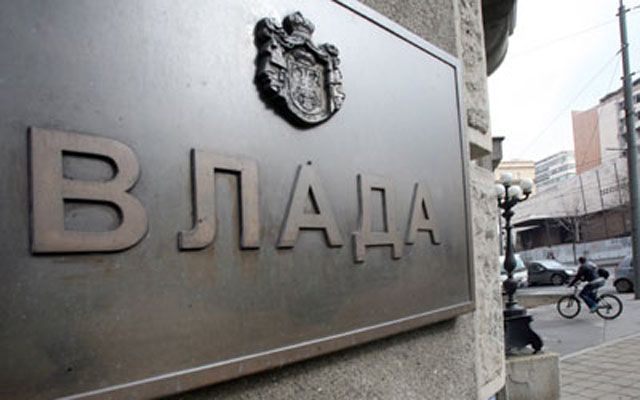
Four people die as result of coronavirus

Five persons die of coronavirus over past 24 hours

60 new cases of coronavirus confirmed

1,063 more new cases of coronavirus

11 people die as result of coronavirus infection

Number of new cases of coronavirus growing

6,498 new cases of coronavirus reported

More than 4,000 new cases of coronavirus in Serbia

Coronavirus claims 13 more lives

17 people die as a result of COVID-19

General Entry Requirements
When entering the Republic of Serbia, it is useful to know the rules that apply to all visitors, irrespective of whether they enter with or without a visa. Further below you will find all about the general entry requirements for the Republic of Serbia.
General Entry Requirements:
- A valid travel document, or a valid identity card if so provided for under a bilateral agreement or by a Decision of the Government of the Republic of Serbia.;
- Valid visa in the passport, if a Serbian visa is required for passport holders of the respective country;
- Proof of sufficient funds for staying in Serbia. Sufficient funds are considered to be 50 Euros per day of stay, proved by possession of the appropriate amount of cash, bank statement;
- Certificate of vaccination or a note that he/she has not contracted a contagious disease despite coming from an area affected by a pandemic, as defined by the information of the Ministry of Health.
- For minors, foreign citizens, parental consent is not required to enter the Republic of Serbia. In order to cross the state border, a minor, a citizen of the Republic of Serbia up to the age of 16, when traveling alone or accompanied by another person who is not his parent or legal representative, must have the certified consent of both parents, if they jointly exercise parental rights, or legal representative;
- It is recommended to have a health insurance for the period of stay in Serbia, covering possible medical costs to the amount of not less than 20,000 Euros.
In accordance with the provisions of the Law on Foreigners of the Republic of Serbia, entry to the Republic of Serbia shall be denied to a foreigner:
- If he/she does not have a valid travel document, or a duly obtained visa for the Republic of Serbia if so required;
- If he/she does not have sufficient funds to sustain him/her during the period of stay in the Republic of Serbia, to return to his/her country of origin or transit into the third country. Sufficient funds are considered to be 50 Euros per day of stay, proved by possession of the appropriate amount of cash or a bank statement,
- If he/she is in transit but does not meet the requirements to enter the third country;
- If the protective measure of removal or the security measure of expulsion is in effect, or if his/her stay is cancelled, and/or other measures recognized in domestic or international law, including the ban on crossing the state border, are effective; the ban shall be imposed throughout the period the respective measure, or the cancellation of leave to stay, is in force;
- If he/she does not have the certificate of vaccination or other proof of good health, when arriving from areas affected by an epidemic of infectious diseases, as determined according to the information provided by the Ministry of Health;
- If so is required for reasons related to protection of the public order or safety of the Republic of Serbia and its citizens;
- If he/she has an international criminal record;
- If there is reasonable doubt that he/she will use the intended visit for purposes other than those declared.
Border authorities may ask to produce for inspection a tourist travel voucher issued by a travel operator (notarized), a duly certified invitation letter from a natural person or a legal entity, a return flight ticket, a proof of paid hotel booking or a certificate verifying the private residence address during his/her visit, a proof of paid health insurance as well as a health insurance policy for the period of stay in the Republic of Serbia covering possible medical costs that cannot be less than EUR 20,000. Other information deemed relevant when crossing the border to prove the purpose of visit may be asked.
Last updated: 17.09.2024.
- Skip to main content
- Skip to "About this site"
Language selection
Search travel.gc.ca.
Help us to improve our website. Take our survey !
COVID-19: travel health notice for all travellers
Serbia travel advice
Latest updates: Editorial change
Last updated: August 7, 2024 14:35 ET
On this page
Safety and security, entry and exit requirements, laws and culture, natural disasters and climate, serbia - take normal security precautions.
Take normal security precautions in Serbia.
Areas bordering Kosovo - Exercise a high degree of caution
Exercise a high degree of caution in the areas bordering Kosovo due to the potential for political tensions and possible unrest.
Back to top
Areas bordering Kosovo
Exercise caution in the areas bordering Kosovo due to the potential for political tensions, possible unrest and landmines.
Stay on the main roads because unexploded landmines and other unexploded ordnance remain in Serbia, particularly in the southern Serbian districts of Bujanovac and Preševo.
Areas bordering North Macedonia
Expect possible delays at the border with North Macedonia due to the migrant situation.
Petty crime
Petty crime, such as pickpocketing, occurs. Thieves target tourists, particularly in crowded public areas such as:
- buses, trains, bus and train stations and airports
- large crowds or public markets
During your trip:
- keep your personal belongings, including passports and other travel documents, in a secure place
- don't show signs of affluence or wear expensive jewellery
- don't carry large sums of cash or valuables unnecessarily
Car thieves target luxury vehicles and four-wheel-drive models. Avoid leaving any luggage or valuables in the vehicle and use secure parking facilities.
Credit card fraud is common. When using credit cards:
- pay careful attention when your cards are being handled by others
- use ATMs located in well-lit public areas or inside a bank or business
- avoid using card readers with an irregular or unusual feature
- cover the keypad with one hand when entering your PIN
- check for any unauthorized transactions on your account statements
Cybercrime occurs. Criminals may compromise public Wi-Fi networks to steal credit card or personal information.
- Use secure public Wi-Fi networks
- Avoid making purchases on unencrypted websites
- Be cautious when posting information on social media
- Be particularly vigilant when contacting or meeting individuals known over the internet
- Never click a suspicious link in an email or text message asking for your credit card details
Overseas fraud
There is a threat of terrorism in Europe. Terrorist attacks have occurred in a number of European cities. There is a potential for other violent incidents.
Targets could include:
- government buildings, including schools
- places of worship
- airports and other transportation hubs and networks
- public areas such as tourist attractions, restaurants, bars, coffee shops, shopping centres, markets, hotels and other sites frequented by foreigners
Always be aware of your surroundings when in public places.
Demonstrations
Demonstrations may occur. Even peaceful demonstrations can turn violent at any time. They can also lead to disruptions to traffic and public transportation.
- Avoid areas where demonstrations and large gatherings are taking place
- Follow the instructions of local authorities
- Monitor local media for information on ongoing demonstrations
Mass gatherings (large-scale events)
2SLGBTQI+ persons
2SLGBTQI+ persons have been targets of harassment and violence. Some Pride events have met organized counter-protests, which may create an intimidating or threatening environment.
Travel and your sexual orientation, gender identity, gender expression and sex characteristics
Soccer matches
Confrontations, which at times become violent, may occur between opposing fans at soccer matches. This is especially true for matches between Belgrade clubs Partizan and Red Star. Traffic and public transportation may also be affected.
- Exercise caution if you attend a soccer match or if you stay near sporting venues
- Be aware of large groups of supporters during a soccer match
Road safety
Road conditions.
Road conditions and road safety can vary greatly throughout the country.
Secondary roads are often narrow and poorly maintained. State Road 22 connecting Belgrade to the border with Montenegro, commonly known as “Ibarska Magistrala,” is dangerous due to poor road conditions.
Serbian licence plates
Travellers driving to neighbouring countries with Serbian plates could face tensions, especially when driving on the roads and at border crossings in:
- Bosnia and Herzegovina
- Croatia
- Albania.
If you plan on travelling in the region with a car registered in Serbia, be aware of your surroundings.
Dial 987 for roadside assistance.
Public transportation
Safety standards vary on public transportation. Buses and trams are often in poor condition and are frequently out of order or forced to stop mid-route for repairs.
Use only officially marked taxis and pre-negotiate fares where a meter is not in use. At Belgrade Nikola Tesla Airport, use the taxi reservation service in the baggage claim area to avoid being charged exorbitant rates for transportation to the city centre.
If departing from a hotel or restaurant, consider calling for a radio taxi. Operators usually speak English and will guarantee an official taxi.
Rail service is slow and often subject to delays due to extensive repairs on outdated railway tracks. Railway equipment is old and poorly maintained. Rail service is not an efficient means of domestic or regional travel.
International bus
Several companies offer domestic and international bus services. The larger companies have modern, well-maintained fleets.
We do not make assessments on the compliance of foreign domestic airlines with international safety standards.
Information about foreign domestic airlines
Every country or territory decides who can enter or exit through its borders. The Government of Canada cannot intervene on your behalf if you do not meet your destination’s entry or exit requirements.
We have obtained the information on this page from the Serbian authorities. It can, however, change at any time.
Verify this information with the Foreign Representatives in Canada .
Entry requirements vary depending on the type of passport you use for travel.
Before you travel, check with your transportation company about passport requirements. Its rules on passport validity may be more stringent than the country’s entry rules.
Regular Canadian passport
Your passport must be valid for the expected duration of your stay in Serbia. Ensure to have your passport stamped when you enter and leave Serbia to avoid issues exiting and re-entering the country.
Passport for official travel
Different entry rules may apply.
Official travel
Passport with “X” gender identifier
While the Government of Canada issues passports with an “X” gender identifier, it cannot guarantee your entry or transit through other countries. You might face entry restrictions in countries that do not recognize the “X” gender identifier. Before you leave, check with the closest foreign representative for your destination.
Other travel documents
Different entry rules may apply when travelling with a temporary passport or an emergency travel document. Before you leave, check with the closest foreign representative for your destination.
Useful links
- Foreign Representatives in Canada
- Canadian passports
Tourist visa: not required for stays up to 90 days Business visa: not required for stays up to 90 days Student visa: not required for stays up to 90 days
If you plan to stay in Serbia longer than 90 days, contact the Embassy of Serbia or one of its consulates for information on requirements that apply to your specific situation.
Foreign diplomatic missions and consulates in Canada
Registration
You must register with the local police within 24 hours of arrival in Serbia. Registration will normally be arranged by your hotel or your host. Failure to register can result in fines and difficulties when departing.
Serbia does not recognize any border crossing points from Kosovo as official international entry points. Don’t attempt to enter Serbia directly from Kosovo unless you initially travelled into Kosovo from Serbia and obtained a valid entry stamp from the Serbian immigration authorities. Otherwise, you should transit via a third country such as Albania, North Macedonia or Montenegro.
Entry to Kosovo from Serbia is subject to delays or may be prohibited entirely. Some border posts have been closed for short periods. Verify the border situation before you undertake travel. If travelling by road, you may have to provide proof of the purpose of your visit to Kosovo at the checkpoint between Serbia and Kosovo. Some travellers may be exempted, such as holders of a Serbian identity card.
Ministry of Foreign Affairs of the Republic of Serbia
- Children and travel
Learn more about travelling with children .
Yellow fever
Learn about potential entry requirements related to yellow fever (vaccines section).

Relevant Travel Health Notices
- Global Measles Notice - 13 March, 2024
- COVID-19 and International Travel - 13 March, 2024
This section contains information on possible health risks and restrictions regularly found or ongoing in the destination. Follow this advice to lower your risk of becoming ill while travelling. Not all risks are listed below.
Consult a health care professional or visit a travel health clinic preferably 6 weeks before you travel to get personalized health advice and recommendations.
Routine vaccines
Be sure that your routine vaccinations , as per your province or territory , are up-to-date before travelling, regardless of your destination.
Some of these vaccinations include measles-mumps-rubella (MMR), diphtheria, tetanus, pertussis, polio, varicella (chickenpox), influenza and others.
Pre-travel vaccines and medications
You may be at risk for preventable diseases while travelling in this destination. Talk to a travel health professional about which medications or vaccines may be right for you, based on your destination and itinerary.
Yellow fever is a disease caused by a flavivirus from the bite of an infected mosquito.
Travellers get vaccinated either because it is required to enter a country or because it is recommended for their protection.
- There is no risk of yellow fever in this country.
Country Entry Requirement*
- Proof of vaccination is not required to enter this country.
Recommendation
- Vaccination is not recommended.
* It is important to note that country entry requirements may not reflect your risk of yellow fever at your destination. It is recommended that you contact the nearest diplomatic or consular office of the destination(s) you will be visiting to verify any additional entry requirements.
About Yellow Fever
Yellow Fever Vaccination Centres in Canada
There is a risk of hepatitis A in this destination. It is a disease of the liver. People can get hepatitis A if they ingest contaminated food or water, eat foods prepared by an infectious person, or if they have close physical contact (such as oral-anal sex) with an infectious person, although casual contact among people does not spread the virus.
Practise safe food and water precautions and wash your hands often. Vaccination is recommended for all travellers to areas where hepatitis A is present.
Tick-borne encephalitis (TBE) is a risk in some areas of this destination. It is a viral disease that affects the central nervous system (brain and spinal cord). It is spread to humans by the bite of infected ticks or occasionally when unpasteurized milk products are consumed.
Travellers to areas where TBE is found may be at higher risk during April to November, and the risk is highest for people who hike or camp in forested areas.
Protect yourself from tick bites . The vaccine is not available in Canada. It may be available in the destination you are travelling to.
Measles is a highly contagious viral disease. It can spread quickly from person to person by direct contact and through droplets in the air.
Anyone who is not protected against measles is at risk of being infected with it when travelling internationally.
Regardless of where you are going, talk to a health care professional before travelling to make sure you are fully protected against measles.
Hepatitis B is a risk in every destination. It is a viral liver disease that is easily transmitted from one person to another through exposure to blood and body fluids containing the hepatitis B virus. Travellers who may be exposed to blood or other bodily fluids (e.g., through sexual contact, medical treatment, sharing needles, tattooing, acupuncture or occupational exposure) are at higher risk of getting hepatitis B.
Hepatitis B vaccination is recommended for all travellers. Prevent hepatitis B infection by practicing safe sex, only using new and sterile drug equipment, and only getting tattoos and piercings in settings that follow public health regulations and standards.
Coronavirus disease (COVID-19) is an infectious viral disease. It can spread from person to person by direct contact and through droplets in the air.
It is recommended that all eligible travellers complete a COVID-19 vaccine series along with any additional recommended doses in Canada before travelling. Evidence shows that vaccines are very effective at preventing severe illness, hospitalization and death from COVID-19. While vaccination provides better protection against serious illness, you may still be at risk of infection from the virus that causes COVID-19. Anyone who has not completed a vaccine series is at increased risk of being infected with the virus that causes COVID-19 and is at greater risk for severe disease when travelling internationally.
Before travelling, verify your destination’s COVID-19 vaccination entry/exit requirements. Regardless of where you are going, talk to a health care professional before travelling to make sure you are adequately protected against COVID-19.
The best way to protect yourself from seasonal influenza (flu) is to get vaccinated every year. Get the flu shot at least 2 weeks before travelling.
The flu occurs worldwide.
- In the Northern Hemisphere, the flu season usually runs from November to April.
- In the Southern Hemisphere, the flu season usually runs between April and October.
- In the tropics, there is flu activity year round.
The flu vaccine available in one hemisphere may only offer partial protection against the flu in the other hemisphere.
The flu virus spreads from person to person when they cough or sneeze or by touching objects and surfaces that have been contaminated with the virus. Clean your hands often and wear a mask if you have a fever or respiratory symptoms.
In this destination, rabies may be present in some wildlife species, including bats. Rabies is a deadly disease that spreads to humans primarily through bites or scratches from an infected animal.
If you are bitten or scratched by an animal while travelling, immediately wash the wound with soap and clean water and see a health care professional.
Before travel, discuss rabies vaccination with a health care professional. It may be recommended for travellers who will be working directly with wildlife.
Safe food and water precautions
Many illnesses can be caused by eating food or drinking beverages contaminated by bacteria, parasites, toxins, or viruses, or by swimming or bathing in contaminated water.
- Learn more about food and water precautions to take to avoid getting sick by visiting our eat and drink safely abroad page. Remember: Boil it, cook it, peel it, or leave it!
- Avoid getting water into your eyes, mouth or nose when swimming or participating in activities in freshwater (streams, canals, lakes), particularly after flooding or heavy rain. Water may look clean but could still be polluted or contaminated.
- Avoid inhaling or swallowing water while bathing, showering, or swimming in pools or hot tubs.
Travellers' diarrhea is the most common illness affecting travellers. It is spread from eating or drinking contaminated food or water.
Risk of developing travellers' diarrhea increases when travelling in regions with poor standards of hygiene and sanitation. Practise safe food and water precautions.
The most important treatment for travellers' diarrhea is rehydration (drinking lots of fluids). Carry oral rehydration salts when travelling.
Insect bite prevention
Many diseases are spread by the bites of infected insects such as mosquitoes, ticks, fleas or flies. When travelling to areas where infected insects may be present:
- Use insect repellent (bug spray) on exposed skin
- Cover up with light-coloured, loose clothes made of tightly woven materials such as nylon or polyester
- Minimize exposure to insects
- Use mosquito netting when sleeping outdoors or in buildings that are not fully enclosed
To learn more about how you can reduce your risk of infection and disease caused by bites, both at home and abroad, visit our insect bite prevention page.
Find out what types of insects are present where you’re travelling, when they’re most active, and the symptoms of the diseases they spread.
Animal precautions
Some infections, such as rabies and influenza, can be shared between humans and animals. Certain types of activities may increase your chance of contact with animals, such as travelling in rural or forested areas, camping, hiking, and visiting wet markets (places where live animals are slaughtered and sold) or caves.
Travellers are cautioned to avoid contact with animals, including dogs, livestock (pigs, cows), monkeys, snakes, rodents, birds, and bats, and to avoid eating undercooked wild game.
Closely supervise children, as they are more likely to come in contact with animals.
Person-to-person infections
Stay home if you’re sick and practise proper cough and sneeze etiquette , which includes coughing or sneezing into a tissue or the bend of your arm, not your hand. Reduce your risk of colds, the flu and other illnesses by:
- washing your hands often
- avoiding or limiting the amount of time spent in closed spaces, crowded places, or at large-scale events (concerts, sporting events, rallies)
- avoiding close physical contact with people who may be showing symptoms of illness
Sexually transmitted infections (STIs) , HIV , and mpox are spread through blood and bodily fluids; use condoms, practise safe sex, and limit your number of sexual partners. Check with your local public health authority pre-travel to determine your eligibility for mpox vaccine.
Medical services and facilities
Good health care is limited in availability outside of major cities. Quality of care varies greatly throughout the country. Doctors and nurses in major cities will often speak English. Physicians and hospitals often expect immediate cash payment for health services. Medical evacuation can be very expensive and you may need it in case of serious illness or injury.
Make sure you get travel insurance that includes coverage for medical evacuation and hospital stays.
Health and safety outside Canada
Medical tourism
Canadian citizens have had serious health complications following dental, cosmetic or other elective surgeries abroad.Before leaving for medical travel:
- make sure you have done your research
- use competent health-care providers only
Receiving medical care outside Canada
Keep in Mind...
The decision to travel is the sole responsibility of the traveller. The traveller is also responsible for his or her own personal safety.
Be prepared. Do not expect medical services to be the same as in Canada. Pack a travel health kit , especially if you will be travelling away from major city centres.
You must abide by local laws.
Learn about what you should do and how we can help if you are arrested or detained abroad .
Transfer to a Canadian prison
Canada and Serbia are signatories to the Convention on the Transfer of Sentenced Persons. This enables a Canadian imprisoned in Serbia to request a transfer to a Canadian prison to complete a sentence. The transfer requires the agreement of both Canadian and Serbia authorities.
This process can take a long time, and there is no guarantee that the transfer will be approved by either or both sides.
Penalties for possession, use or trafficking of illegal drugs are severe. Convicted offenders can expect long prison sentences and heavy fines.
Drugs, alcohol and travel
Photography
Photography of military or police installations, vehicles and personnel is prohibited, unless authorized by the Ministry of Defence.
Identification
You must carry identification, such as a passport, at all times. Keep a photocopy of your passport in case it is lost or confiscated.
Dual citizenship
Dual citizenship is legally recognized in Serbia.
If you are a Canadian citizen, but also a citizen of Serbia, our ability to offer you consular services may be limited while you're there. You may also be subject to different entry/exit requirements .
Dual citizens
International Child Abduction
The Hague Convention on the Civil Aspects of International Child Abduction is an international treaty. It can help parents with the return of children who have been removed to or retained in certain countries in violation of custody rights. The convention applies between Canada and Serbia.
If your child was wrongfully taken to, or is being held in Serbia, and if the applicable conditions are met, you may apply for the return of your child to the Serbian court.
If you are in this situation:
- act as quickly as you can
- contact the Central Authority for your province or territory of residence for information on starting an application under The Hague Convention
- consult a lawyer in Canada and in Serbia to explore all the legal options for the return of your child
- report the situation to the nearest Canadian government office abroad or to the Vulnerable Children's Consular Unit at Global Affairs Canada by calling the Emergency Watch and Response Centre
If your child was removed from a country other than Canada, consult a lawyer to determine if The Hague Convention applies.
Be aware that Canadian consular officials cannot interfere in private legal matters or in another country's judicial affairs.
- List of Canadian Central Authorities for the Hague Convention
- International Child Abductions: A guide for affected parents
- The Hague Convention – Hague Conference on Private International Law
- Canadian embassies and consulates by destination
- Request emergency assistance
Serbian law does not prohibit sexual acts between individuals of the same sex. However, homosexuality is not widely socially accepted.
You should carry an international driving permit
You can drive in Serbia with a Canadian driver’s license for up to 90 days.
International Driving Permit
Vehicles must be equipped for emergency situations:
- a first aid kit
- a warning triangle
- a tow rope
- functional spare tire;
- a reflective vest that must be worn immediately when leaving a vehicle that is stranded or involved in an accident.
Children under the age of 12 may not sit in the front seat. All children under 135cm must sit in a child car seat.
In order to avoid customs charges, you are required to declare items of value, such as jewellery, photographic and computing equipment, that you are temporarily importing into Serbia. These items should be intended for your own personal use and you must take them with you when leaving the country.
The currency of Serbia is the Serbian dinar (RSD).
Euros are not legal tender in Serbia. All banks and exchange offices will readily convert euros.
If you are carrying €10,000 or more, or the equivalent in other currencies, you must make a declaration to customs when you enter or leave Serbia. It includes sums in:
- banknotes and coins
- bearer negotiable instruments such as cheques, travellers’ cheques, promissory notes and money orders
- bonds, shares
- gold coins with a gold content of at least 90 %
- gold bars, nuggets or clumps with a gold content of at least 99.5 %
- any other convertible asset
Your funds could be confiscated if you fail to make a declaration when leaving the country.
Climate change
Climate change is affecting Serbia. Extreme and unusual weather events are becoming more frequent and may affect your travel plans. Monitor local news to stay informed on the current situation.
Seismic activity
Serbia is located in an active seismic zone.
Earthquakes - What to Do?
Bush and forest fires
Bush and forest fires are common in the summer months. The air quality in areas near active fires may deteriorate due to heavy smoke. In case of a major fire, stay away from the affected area, particularly if you suffer from respiratory ailments.
- Always follow the instructions of local emergency services personnel
- Monitor local media for up-to-date information on the situation
Heavy rains and thunderstorms during spring and summer may result in flooding and may cause significant damage to roads and generate localized landslides.
Snowstorms throughout winter may lead to problems along transportation routes and with power and telecommunications systems.
- Pay close attention to road conditions and refrain from driving during or immediately after severe storms
- Monitor local weather forecasts
Local services
In case of emergency, dial:
- police: 192
- medical assistance: 194
- firefighters: 193
Consular assistance
Montenegro, North Macedonia, Serbia
For emergency consular assistance, call the Embassy of Canada to Serbia, in Belgrade, and follow the instructions. At any time, you may also contact the Emergency Watch and Response Centre in Ottawa.
The decision to travel is your choice and you are responsible for your personal safety abroad. We take the safety and security of Canadians abroad very seriously and provide credible and timely information in our Travel Advice to enable you to make well-informed decisions regarding your travel abroad.
The content on this page is provided for information only. While we make every effort to give you correct information, it is provided on an "as is" basis without warranty of any kind, expressed or implied. The Government of Canada does not assume responsibility and will not be liable for any damages in connection to the information provided.
If you need consular assistance while abroad, we will make every effort to help you. However, there may be constraints that will limit the ability of the Government of Canada to provide services.
Learn more about consular services .
Risk Levels
take normal security precautions.
Take similar precautions to those you would take in Canada.
Exercise a high degree of caution
There are certain safety and security concerns or the situation could change quickly. Be very cautious at all times, monitor local media and follow the instructions of local authorities.
IMPORTANT: The two levels below are official Government of Canada Travel Advisories and are issued when the safety and security of Canadians travelling or living in the country or region may be at risk.
Avoid non-essential travel
Your safety and security could be at risk. You should think about your need to travel to this country, territory or region based on family or business requirements, knowledge of or familiarity with the region, and other factors. If you are already there, think about whether you really need to be there. If you do not need to be there, you should think about leaving.
Avoid all travel
You should not travel to this country, territory or region. Your personal safety and security are at great risk. If you are already there, you should think about leaving if it is safe to do so.
We’re sorry, this site is currently experiencing technical difficulties. Please try again in a few moments. Exception: request blocked

Search Smartraveller

Latest update
Exercise normal safety precautions in Serbia.
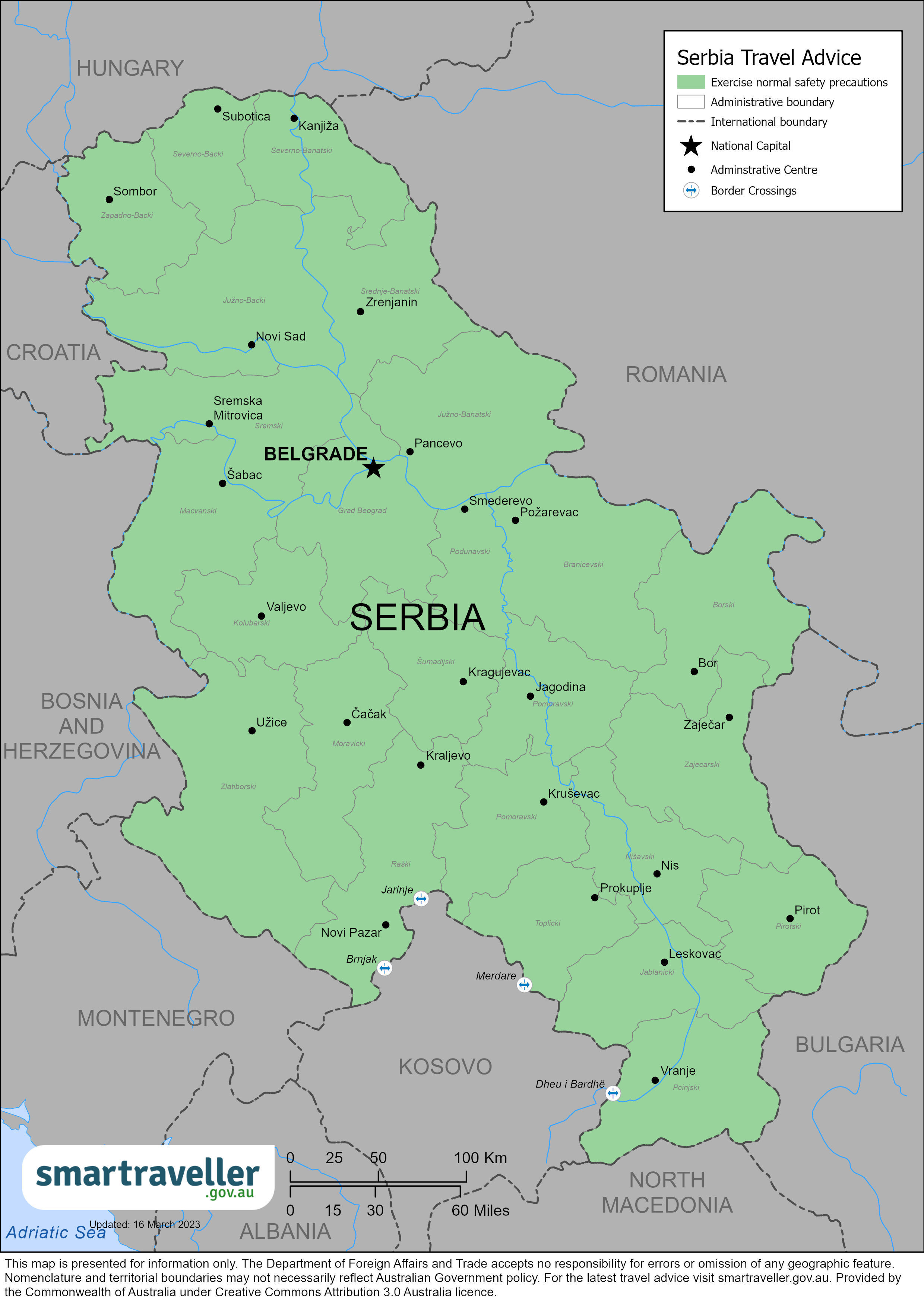
Serbia (PDF 323.82 KB)
Europe (PDF 2.62 MB)
Local emergency contacts
Fire and rescue services, medical emergencies, advice levels.
- Terrorism is a threat worldwide. Terrorists have staged attacks in European cities. Targets have included public transport, transport hubs, and public places popular with tourists.
- Protests and rallies are common. Avoid crowds and demonstrations as they may turn violent. Foreign nationals have been detained after attending protests. Demonstrations might disrupt transport. Monitor local media for information.
- The area of Southern Serbia bordering Kosovo has unexploded landmines. Only use well-known roads and paths.
- Violent attacks sometimes occur near nightclubs. Targeted bomb attacks and gun violence can occur. Many Serbians own guns. Be alert to suspicious behaviour and avoid trouble spots.
- Earth tremors and flooding can occur. Bushfires happen in summer. Snow and ice can be a danger in winter. Monitor the media for updates.
Full travel advice: Safety
- Air pollution can be high in some Serbian cities, including Belgrade. If you have a breathing condition, talk to your doctor before you travel.
- Medical facilities are below Australian standards. If you become seriously ill or injured, you may need to be evacuated. Make sure your insurance covers this.
Full travel advice: Health
- Don't use or carry illegal drugs. Penalties are severe.
- It's illegal to photograph military and police personnel and equipment.
- Serbia recognises dual nationality. As a dual citizen, you may have to complete outstanding military service obligations. Check with an embassy or consulate of Serbia .
- Same-sex relationships are legal but not widely accepted. Avoid public displays of affection.
Full travel advice: Local laws
- Entry and exit conditions can change at short notice. You should contact the nearest embassy or consulate of Serbia for the latest details.
- You don't need a visa for tourist visits of up to 90 days in a 6-month period. This applies from the date of the first entry. You'll need a visa for other situations.
- Full details of Serbia's entry requirements are on the Ministry of Foreign Affairs website and can change without notice. Monitor local media and follow the Republic of Serbia - Citizen Services website (in Serbian) for updates.
Full travel advice: Travel
Local contacts
- The Consular Services Charter details what we can and can't do to help you overseas.
- For consular help, contact the Australian Embassy in Belgrade.
- To stay up to date with local information, follow the embassy’s social media accounts.
Full travel advice: Local contacts
Full advice
Terrorist attacks could occur anywhere and at any time.
In June, one person was killed in an attack outside of the Israeli embassy in Belgrade.
Be alert to possible threats, especially in public places. Terrorists may target tourist areas or other places frequented by foreigners, and where large crowds may gather.
Possible targets include:
- places of worship or religious holidays
- hotels, clubs, restaurants and cafes
- markets and shopping malls
- outdoor recreation events, including festivals, concerts, and sporting venues
- public transport, airports and railway hubs
To stay safe:
- report suspicious activities or items to the police
- check the media for new threats
- take official warnings seriously
- follow the instructions of local authorities
If there’s an attack, leave the area as soon as it's safe to do so.
Terrorism is a threat worldwide.
More information:
Civil unrest and political tension
Demonstrations and protests.
Protests are common in Belgrade and other towns and cities across Serbia. They're usually peaceful but can turn violent or cause major traffic and public transport disruptions. Foreigners have been detained after attending protests.
Some sporting events have turned violent, injuring people and damaging property. There have been clashes between police and fans near sports venues and between fans of opposing teams. While foreigners aren't targets, there have been isolated incidents where the clashes have affected foreigners.
To protect yourself during periods of unrest:
- monitor local media for updates
- avoid affected areas
- follow the advice of local authorities
Be careful of celebratory gunfire or fireworks, especially around major holidays, celebrations and after sporting victories.
Border control
The level of security at Serbian land borders can change without notice. The border with North Macedonia is an entry point for asylum seekers attempting to travel through Serbia to the EU. Delays and strict controls at the border are common, especially in the European summer.
- avoid crowds in border areas
- always carry your passport at or near borders
Kosovo-Serbia border
The Republic of Kosovo declared independence from Serbia in February 2008. Serbia doesn't recognise Kosovo's independence.
Security along the border between Serbia and Kosovo can change quickly. Be cautious travelling in the Kosovo border area. The security situation can be unpredictable.
In the past, clashes between security forces and armed groups have happened:
- in the Presevo area of southern Serbia
- in the Bujanovac area of Southern Serbia
- at border points with Kosovo
Further unrest may occur at any time.
- Demonstrations and civil unrest
- Travel advice for Kosovo
Unexploded weapons
The area of Southern Serbia bordering Kosovo has unexploded landmines and other remnants of war. Only use well-known roads or paths.
To stay safe in southern Serbia, only use well-known roads and paths and be alert to uncleared landmine warning signs.
Pickpocketing, bag snatching, and other petty crimes are common. Criminals often target foreigners in crowded places, such as markets and on public transport.
To reduce your risk of crime:
- pay close attention to your personal belongings, especially in crowds
- carry only what you need
- hold bags and backpacks in front of you
Violent crime
Violent criminal acts are usually linked to organised crime. They aren't directed at foreigners.
However, there have been several violent and fatal attacks against foreigners, particularly late at night:
- near nightclubs
- in inner-city suburbs
Many Serbians own guns, and shootings happen.
To protect yourself from violent crime:
- move away from dangerous situations
- avoid trouble spots
- be ready to leave quickly if trouble arises
Credit card fraud
Credit card fraud is common.
Only use ATMs in banks, shops and shopping centres.
Always take care to protect your card and PIN.
Be alert for suspicious behaviour.
To reduce your risk of fraud:
- avoid ATMs that open onto the street
- keep your credit card in sight during transactions
Cyber security
You may be at risk of cyber-based threats during overseas travel to any country. Digital identity theft is a growing concern. Your devices and personal data can be compromised, especially if you're connecting to Wi-Fi, using or connecting to shared or public computers, or Bluetooth.
Social media can also be risky in destinations where there are social or political tensions or laws that may seem unreasonable by Australian standards. Travellers have been arrested for things they have said on social media. Don't comment on local or political events on your social media.
More information:
- Cyber security when travelling overseas
Kidnapping can happen anywhere, anytime, including in destinations that are typically at lower risk.
The Australian Government's longstanding policy is that it doesn't make payments or concessions to kidnappers.
More information:
- Kidnapping
Climate and natural disasters
Serbia experiences natural disasters and severe weather .
Severe earthquakes are rare, but tremors are common.
Flooding can happen throughout the country, especially along the Sava River.
Bush and forest fires can occur in summer, from June to September, especially in southern Serbia.
Extreme hot and dry periods may lead to water shortages.
In winter, some parts of Serbia can experience extremely low temperatures from October to March. Snow and ice are hazards.
Monitor local media and weather reports. Plan ahead.
If there is a natural disaster or severe weather:
- secure your passport in a safe, waterproof location or carry it in a waterproof bag
- keep in contact with family and friends
- monitor the media and other sources
Register with the Global Disaster Alert and Coordination System to receive alerts on major disasters.
Travel insurance
Get comprehensive travel insurance before you leave.
Your policy needs to cover all overseas medical costs, including medical evacuation. The Australian Government won't pay for these costs.
If you can't afford travel insurance, you can't afford to travel. This applies to everyone, no matter how healthy and fit you are.
If you're not insured, you may have to pay thousands of dollars up-front for medical care.
- what activities and care your policy covers
- that your insurance covers you for the whole time you'll be away
Physical and mental health
Consider your physical and mental health before you travel, especially if you have an existing medical condition.
See your doctor or travel clinic to:
- have a basic health check-up
- ask if your travel plans may affect your health
- plan any vaccinations you need
Do this at least 8 weeks before you leave.
If you have immediate concerns for your welfare or the welfare of another Australian, call the 24-hour Consular Emergency Centre on +61 2 6261 3305 or contact your nearest Australian Embassy, High Commission or Consulate to discuss counselling hotlines and services available in your location.
- General health advice
- Healthy holiday tips (Healthdirect Australia)
Medications
Not all medications available over the counter or by prescription in Australia are available in other countries. Some may even be considered illegal or a controlled substance, even if prescribed by an Australian doctor.
If you plan to bring medication, check if it's legal in Serbia. Take enough legal medication for your trip.
Carry a copy of your prescription or a letter from your doctor stating:
- what the medicine is
- your required dosage
- that it's for personal use only
Health risks
Air pollution levels can be high, especially in winter. Heavy smoke from coal and wood-burning heaters can stay in the air.
Accidental release of toxic matter from factories is common.
Authorities don't always issue public health warnings.
If you have asthma or other breathing difficulties, speak to your doctor before travelling.
Tick-borne encephalitis
There's a risk of tick-borne encephalitis in forests and fields.
Ticks are common in country areas. They are active from spring to autumn.
Take measures to avoid tick bites, particularly in rural areas.
During and after visiting a forest:
- check your body for ticks
- carefully remove any whole ticks as soon as possible
- be alert for any signs of infection
Insect-borne diseases
Cases of West Nile virus are reported throughout Serbia. There's no vaccine to prevent it.
To protect yourself from disease:
- make sure your accommodation is insect-proof
- use insect repellent
- wear long, loose, light-coloured clothing
- Infectious diseases
Other health risks
Outbreaks of foodborne and other infectious diseases happen from time to time. These include:
- trichinosis /trichinellosis
- brucellosis
To protect yourself from illness, avoid the following:
- raw and under-cooked food, such as salads
- unpasteurised dairy products
- Get medical advice if you have a fever or diarrhoea.
Medical care
Medical facilities in Serbia are below Australian standards.
If you're injured or become seriously ill, you'll need to be evacuated to a place with better facilities. Medical evacuation can be very expensive.
You must wear a face mask in health facilities.
You're subject to all local laws and penalties, including those that may appear harsh by Australian standards. Research local laws before travelling.
If you're arrested or jailed, the Australian Government will do what it can to help you under our Consular Services Charter . But we can't get you out of trouble or out of jail.
Penalties for drug offences are severe and include long prison terms in local jails.
- Carrying or using drugs
Photography
It's illegal to photograph military and police:
Australian laws
Some Australian criminal laws still apply when you're overseas. If you break these laws, you may face prosecution in Australia.
- Staying within the law and respecting customs
Dual citizenship
Serbia recognises dual nationality.
Serbia abolished compulsory military service in 2011.
If you're an Australian-Serbian dual national, you could have military service duties from before this date.
Check with an Embassy or Consulate of Serbia before you travel.
If you're returning to Serbia after many years away, living conditions may be different to what you expect. Do your research before travelling.
- Dual nationals
- Serbian diplomatic missions
Local customs
Same-sex relationships are legal but not widely accepted.
Verbal and physical aggression is sometimes directed towards the LGBTQIA+ community. Avoid public displays of affection.
- Advice for LGBTQIA+ Travellers
Visas and border measures
Every country or territory decides who can enter or leave through its borders. For specific information about the evidence you'll need to enter a foreign destination, check with the nearest embassy, consulate or immigration department of the destination you're entering.
You don't need a visa for tourist visits of up to 90 days in a 6-month period. This applies from the date of the first entry.
You'll need a visa for other situations.
Entry and exit conditions can change at short notice. Contact the nearest embassy or consulate of Serbia for details about visas, currency, customs and quarantine rules.
The security situation along the Kosovo-Serbia border is volatile.
Don't attempt to enter Serbia from Kosovo unless you first travelled to Kosovo from Serbia.
You'll need a valid, recent Serbian entry stamp in your passport to travel from Kosovo to Serbia. You'll have to enter Serbia from another country if you don't.
Serbia can deny entry if you have any border entry or exit stamps from Kosovo in your passport. In practice, this does not occur often. Still, the Serbian border police will cancel the Kosovo entry/exit records by stamping over them.
Political violence has broken out many times at the border crossings of:
- Jarinje, also known as Gate 1
- Brnjak, also known as Gate 31
Be cautious travelling in the Kosovo border area. See Safety
- Serbian Ministry of Foreign Affairs (English version)
Some countries won't let you enter unless your passport is valid for 6 months after you plan to leave that country. This can apply even if you're just transiting or stopping over.
Some foreign governments and airlines apply the rule inconsistently. Travellers can receive conflicting advice from different sources.
You can end up stranded if your passport is not valid for more than 6 months.
The Australian Government does not set these rules. Check your passport's expiry date before you travel. If you're not sure it'll be valid long enough, consider getting a new passport .
Lost or stolen passport
Your passport is a valuable document. It's attractive to people who may try to use your identity to commit crimes.
Some people may try to trick you into giving them your passport. Always keep it in a safe place.
If your passport is lost or stolen, tell the Australian Government as soon as possible:
- In Australia, contact the Australian Passport Information Service .
- If you're overseas, contact the nearest Australian embassy or consulate .
Passport with 'X' gender identifier
Although Australian passports comply with international standards for sex and gender, we can't guarantee that a passport showing an 'X' in the sex field will be accepted for entry or transit by another country. Contact the nearest embassy, high commission or consulate of your destination before you arrive at the border to confirm if authorities will accept passports with 'X' gender markers.
- Advice for LGBTQIA+ travellers
Serbia's currency is the Serbian Dinar (RSD). You can't change it outside Serbia.
On arrival, you'll need to declare currency and valuables with 10,000 euros or equivalent value. Valuables may include:
Make sure you get a copy from customs officials. You'll need the declaration form when you leave Serbia.
They could be taken away if you don't declare your currency or valuables.
Most banks in towns and cities have ATMs that accept international bank cards.
ATMs only dispense Serbian Dinar.
Traveller's cheques aren't widely accepted. However, larger branches of some banks will cash them.
Local travel
Border crossings.
Border crossings close at short notice. Delays and disruptions to cross-border transport are possible.
- avoid large groups near borders
- have back-up plans
Driving permit
To drive, you'll need both:
- a current Australian driver's licence (digital driver's licences may not be accepted)
- a valid international driving permit (IDP)
Get your IDP before you leave Australia.
Driving without an IDP could void your travel and vehicle insurance.
Road travel
Driving can be dangerous due to poorly maintained vehicles and roads and poor driving habits.
It's dangerous to drive after bad weather.
Drivers and pedestrians frequently ignore road rules.
In rural areas, pedestrians and farm animals sometimes share the roads.
Snow and ice are additional hazards in winter. Local authorities may not always clear roads after heavy snowfall.
It's illegal not to wear a seatbelt if one is available.
The blood alcohol limit for drivers is 0.03%.
Call 1987 for roadside assistance.
- Driving or riding
Only use registered taxis and authorised limousines. Ask your hotel to arrange this for you.
Registered taxis have both a municipal registration number and a taxi number.
Public transport
Public transport is usually reliable, but it can be crowded. Standards vary.
- Transport and getting around safely
DFAT doesn't provide information on the safety of individual commercial airlines or flight paths.
Check Serbia's air safety profile with the Aviation Safety Network.
Emergencies
Depending on what you need, contact your:
- family and friends
- travel agent
- insurance provider
For non-emergency criminal issues, contact the local police.
Always get a police report when you report a crime.
Your insurer should have a 24-hour emergency number.
Consular contacts
Read the Consular Services Charter for what the Australian Government can and can't do to help you overseas.
For consular assistance, contact the Australian Embassy in Belgrade.
Australian Embassy, Belgrade
Vladimira Popovica 38-40, 8th floor 11070 Belgrade, Serbia Phone: (+381 11) 330 3400 Email: [email protected] Website: serbia.embassy.gov.au Facebook: Australia in Serbia
Check the Embassy website for details about opening hours and any temporary closures.
24-hour Consular Emergency Centre
In a consular emergency, if you can't contact an embassy, call the 24-hour Consular Emergency Centre on:
- +61 2 6261 3305 from overseas
- 1300 555 135 in Australia

Travelling to Serbia?
Sign up to get the latest travel advice updates..
Be the first to know official government advice when travelling.
Serbia Travel Restrictions
Traveller's COVID-19 vaccination status
Travelling from India to Serbia
Open for vaccinated visitors
COVID-19 testing
Not required
Not required for vaccinated visitors
Restaurants
Recommended in enclosed environments.
Ready to travel?
Find flights to serbia, find stays in serbia, explore more countries on travel restrictions map, destinations you can travel to now, netherlands, new zealand, philippines, saudi arabia, switzerland, united arab emirates, united kingdom, united states, know when to go.
Sign up for email alerts as countries begin to open - choose the destinations you're interested in so you're in the know.
Can I travel to Serbia from India?
Most visitors from India, regardless of vaccination status, can enter Serbia.
Can I travel to Serbia if I am vaccinated?
Fully vaccinated visitors from India can enter Serbia without restrictions.
Can I travel to Serbia without being vaccinated?
Unvaccinated visitors from India can enter Serbia without restrictions.
Do I need a COVID test to enter Serbia?
Visitors from India are not required to present a negative COVID-19 PCR test or antigen result upon entering Serbia.
Can I travel to Serbia without quarantine?
Travellers from India are not required to quarantine.
Do I need to wear a mask in Serbia?
Mask usage in Serbia is recommended in enclosed environments.
Are the restaurants and bars open in Serbia?
Restaurants in Serbia are open. Bars in Serbia are .
We’re sorry, this site is currently experiencing technical difficulties. Please try again in a few moments. Exception: request blocked

IMAGES
VIDEO
COMMENTS
HIV/AIDS Restrictions: The U.S. Department of State is unaware of any HIV/AIDS entry restrictions for visitors to or foreign residents of Serbia. Temporary Residence Permits: If you wish to stay in Serbia longer than 90 days during any 180-day period, you must apply for a temporary residence permit from the local police with jurisdiction over ...
Read the country information page for additional information on travel to Serbia. If you decide to travel to Serbia: Be aware of your surroundings. Do not display signs of wealth, such as expensive watches or jewelry. Do not answer your door at your hotel/residence unless you know who it is. Stay alert in locations frequented by Westerners.
Office for Cooperation with the Diaspora and Serbs in the Region. Commission of the Republic of Serbia for Cooperation with UNESCO. Отвори навигацију. Travel to Serbia. General Entry Requirements. Visa Requirements. Visa regime. Registration of Stay. Driver's license and motor vehicle insurance.
Bars in Serbia are . Find continuously updated travel restrictions for Serbia such as border, vaccination, COVID-19 testing, and quarantine requirements.
FCDO travel advice for Serbia. Includes safety and security, insurance, entry requirements and legal differences.
General Entry Requirements. A valid travel document, or a valid identity card if so provided for under a bilateral agreement or by a Decision of the Government of the Republic of Serbia.; Valid visa in the passport, if a Serbian visa is required for passport holders of the respective country; Proof of sufficient funds for staying in Serbia.
ENTRY REGIMES APPLICABLE TO CITIZENS OF THE REPUBLIC OF SERBIA UNDER THE COVID-19 PANDEMIC CONDITIONS (updated 19.01.2024.) Citizens of the Republic of Serbia travelling abroad are advised to checked detailed information in advance to determine whether and under what conditions their travel may take place, bearing in mind that many countries have imposed restrictions on entry and stay of ...
Assistance: Embassy Belgrade, Serbia. +381 (11) 706-4000 (24 hours) [email protected]. Embassy website. State Department - Consular Affairs Serbia Country Information Follow us on Facebook and Twitter. 888-407-4747 or 202-501-4444.
To travel from Kosovo to Serbia, you must have a Serbian entry stamp from Belgrade, Niš or Kraljevo airports, or from one of Serbia's land border crossings with: Bosnia and Herzegovina;
This page was last updated on 16 December, 2021. At a Glance Travel Restrictions Entry For Vaccinated Travelers: Partially Allowed Vaccination Requirements: Individuals fully vaccinated in Serbia do not need to present a negative COVID-19 test, nor quarantine, upon return to Serbia. Tourist Entry: Allowed Testing: Negative PCR test results required for some countries. […]
Belgrade, 2 May 2022. The Serbian government announced that as of Tuesday, 3 May, all control measures and restrictions related to the COVID-19 infectious disease for the entry of passengers into the Republic of Serbia will be abolished for Serbian citizens and foreigners alike. Starting from midnight, Serbian citizens and foreigners will not ...
September 14, 2021. Serbia's Travel Advisory has been raised to Level 4: Do not travel to Serbia due to COVID-19. Exercise increased caution in Serbia due to COVID-19 and crime. Visit the Embassy's COVID-19 page for more information on COVID-19 in Serbia. Read the Department of State's COVID-19 page before you plan any international travel.
General Entry Requirements: A valid travel document, or a valid identity card if so provided for under a bilateral agreement or by a Decision of the Government of the Republic of Serbia.; Valid visa in the passport, if a Serbian visa is required for passport holders of the respective country; Proof of sufficient funds for staying in Serbia.
large crowds or public markets. During your trip: keep your personal belongings, including passports and other travel documents, in a secure place. don't show signs of affluence or wear expensive jewellery. don't carry large sums of cash or valuables unnecessarily. Car thieves target luxury vehicles and four-wheel-drive models.
If your travel plans in Serbia include outdoor activities, take these steps to stay safe and healthy during your trip. Stay alert to changing weather conditions and adjust your plans if conditions become unsafe. Prepare for activities by wearing the right clothes and packing protective items, such as bug spray, sunscreen, and a basic first aid ...
Find continuously updated travel restrictions for Serbia such as border, vaccination, COVID-19 testing, and quarantine requirements.
Location: Serbia Event: As of July 1, the Serbian Ministry of Health announced 14,836 confirmed cases of COVID-19 in Serbia and 281 deaths. 8,626 people have been tested in the past 24 hours, with 272 confirmed cases among them.In total, there are an estimated 1,783 active cases. There are currently no restrictions on entry to Serbia for foreigners or Serbian citizens.
Still current at: 04 September 2024. Updated: 08 August 2024. Latest update:We've reviewed our travel advice for Serbia and continue to advise exercise normal safety precautions. You don't need a visa for tourist visits of up to 90 days in a 6-month period. You'll need a visa for other situations.
Bars in Serbia are . Find continuously updated travel restrictions for Serbia such as border, vaccination, COVID-19 testing, and quarantine requirements.
Today, the United States is designating three entities and two individuals for their connection to Russia's destabilizing actions abroad. According to new information, much of which originates from employees of Russian state-funded RT (formerly "Russia Today"), we now know that RT moved beyond being simply a media outlet and has been an entity with cyber capabilities. It is also engaged in ...